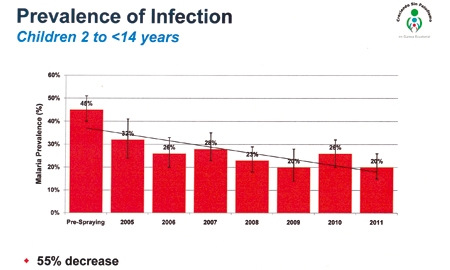With a wealth of natural resources, most notably oil and gas, Equatorial Guinea is an attractive country for foreign energy corporations. However, the arrival of international companies can represent a threat to resources, the environment and the local population if proper care is not taken. Some international companies distinguish themselves by their ability to integrate with the community, and help improve conditions in the country.
Marathon Oil, Equatorial Guinea
LNG (
EG LNG) and Atlantic Methanol Production Company (
AMPCO) are three linked corporations currently working in Equatorial Guinea that exemplify corporate responsibility and involvement through impressive contributions to this African nation.
American-based independent energy company
Marathon Oil started work in Equatorial Guinea in 2002, with a 63% interest in the Alba gas condensate field.
Marathon Oil is the major shareholder in
EG LNG, which currently can process 650 million standard cubic feet of gas from Alba per day.
Meanwhile, another
Marathon Oil affiliate,
AMPCO, operates one of the largest methanol plants in the world, with the capacity to produce more than 1 million metric tons of methanol per year. Since 2001,
AMPCO has produced chemical-grade methanol from the natural gas found onshore Bioko Island, selling most of it in the United States and Europe.
These companies not only work side by side in producing energy throughout Equatorial Guinea, but also participate heavily in corporate social responsibility (CSR) programs.
“Investing in Equatorial Guinea’s human capital is probably the place that we can have the longest-lasting effect.” Bill Wheeler,
Managing Director of EG LNG |
“I think we have a responsibility to do things in a manner that promotes the country’s willingness to have us here,” says Bill Wheeler, Managing Director of
EG LNG. “We try to interact with the local economy in such a way that is positive for them.”
EG LNG engages in several CSR-related projects that include sponsoring training, supplying schools with materials, and drilling water wells.
“CSR is something that we are really proud of,” explains Mr. Wheeler. “
EG LNG has gotten a reputation for being the water company. We drill a lot of water wells and haul the water to various areas year round. That may seem like a small thing but it really makes a big difference.”
While EG LNG has become well known for its involvement with water,
Marathon Oil has been dedicated to the eradication of malaria on Bioko Island since 2003.
Marathon Oil and some of its business partners, including
AMPCO, joined the local government and an NGO to initiate the Bioko Island Malaria Control Program (BIMCP), spending $16 million between 2004-2008. The BIMCP initiative includes indoor residual spraying for every island household, mosquito-net distribution, medical testing and treatment and an educational campaign to help inform people about malaria prevention and treatment.
“The impact we have had on child mortality is truly amazing,” says Cathy Krajicek,
Marathon Oil’s Resident Manager, explaining that the prevalence of malaria infection declined 55% since the start of the BIMCP.
“Childhood mortality has been reduced by 64% for all-cause, under age five mortality for years 2004 through 2008. These are truly things that make a difference to the country and to people’s lives.”
Along with health-related programs, these companies have been working for years to develop a skilled workforce from the native population. The three companies employ approximately 1,700 workers, two-thirds of which are Equatorial Guinea nationals. Such workers cannot simply be hired off the street – they need to undergo years of training to be able to work in the oil business.
AMPCO, for one, not only builds schools and donates books and computers, but also integrates the Equatoguineans into its company through rigorous training programs, often held abroad. According to Pedro Arasa, Resident Manager at
AMPCO, the company has 454 national employees, 104 of whom have completed their technical training program. Of these, 83 received their specialized training overseas.
EG LNG expands this educational commitment to its own national workforce by also sponsoring training for nurses and healthcare providers. “Investing in Equatorial Guinea’s human capital is probably the place that we can have the longest-lasting effect,” explains Mr. Wheeler.
While being economically successful in Equatorial Guinea is imperative for these companies, multi-million dollar CSR programs are much more than PR exercises – they can have a genuinely positive impact on the country and its population.
“This is a place where you can actually make real change happen,” says Ms. Krajicek. “You actually change the country… I really believe that we will leave this place better than we found it.”

0 COMMENTS